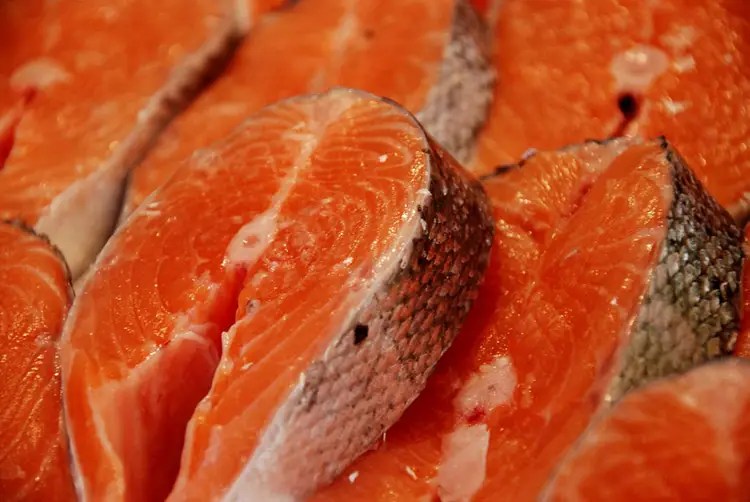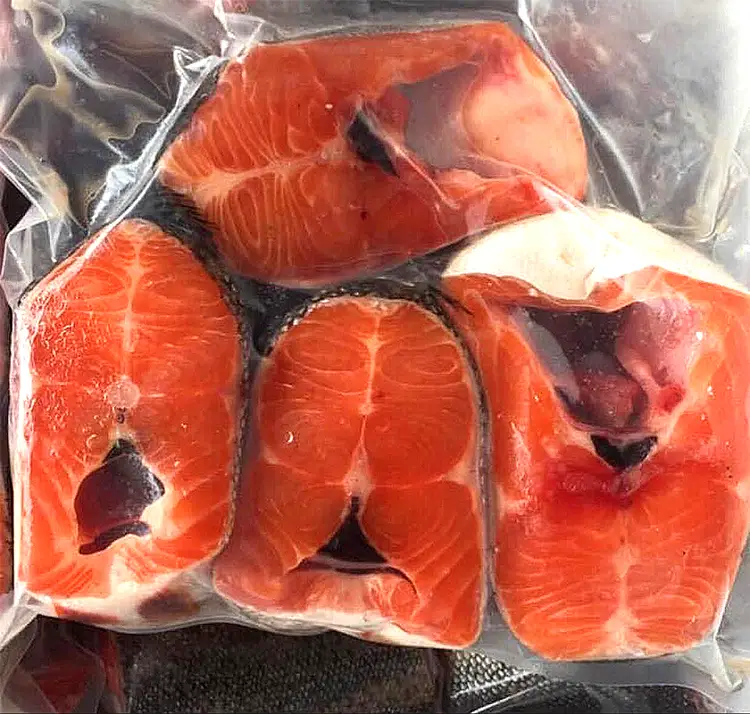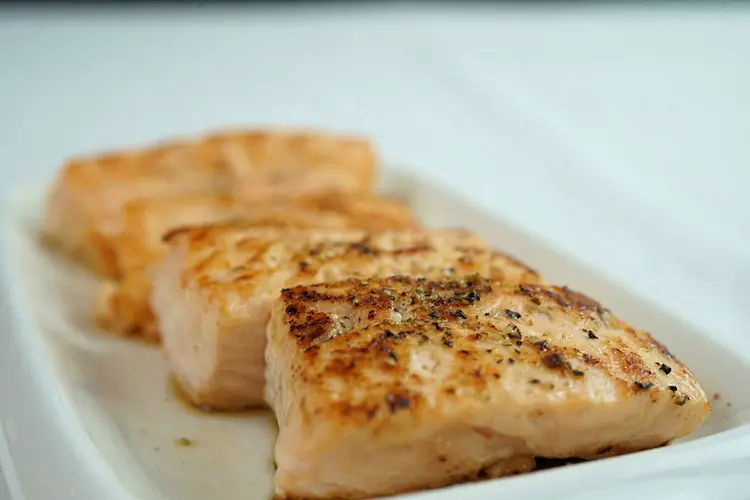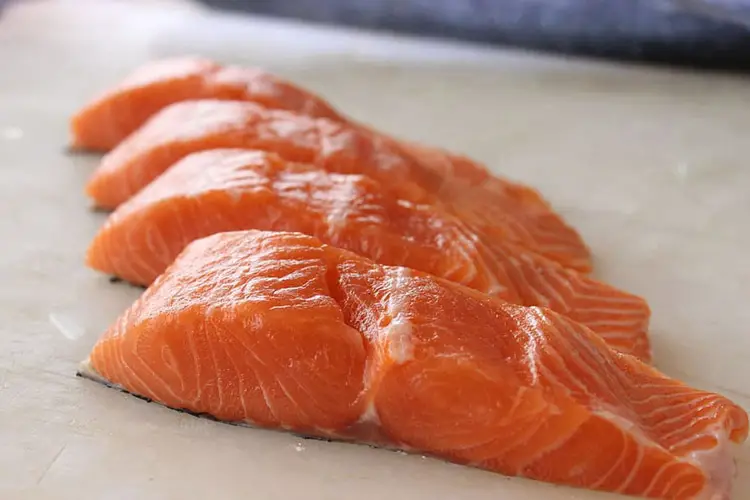Sushi lovers around the world enjoy raw salmon as a staple ingredient in various sushi dishes. You won’t want to skip this delicious protein source if you are part of this group.
However, raw salmon only tastes good when fresh. Here comes a concern: How long does raw salmon last in the fridge? And how can you store it properly?
This article will give you detailed answers to these questions. Let’s discover how to keep your raw salmon tasting great and last longer in the fridge!
How Long Does Raw Salmon Last in the Fridge?
In fact, raw salmon will be good in the fridge for 1 to 2 days after you buy it from the supermarket. After that time, the fish will not be safe to eat.
Raw salmon may stay good in the fridge for a few days because the refrigeration process slows down the growth of bacteria. Hence, when kept below 32°F, the fish can preserve its freshness.
However, please note that the fridge can only slow down bacterial development and doesn’t stop it. Over time, bacteria will multiply, finally leading to spoilage. That’s why you should only store it there for one day or two.
Besides, for the raw salmon to remain edible in the fridge as long as possible, ensure you buy a high-quality product. If there are any spoilage signs, refrigerating the spoiled fish doesn’t make sense.


Read more: How long can defrosted salmon stay in the fridge?
How Should You Store Raw Salmon in the Fridge?
You can keep raw salmon in the fridge for about two days. However, it can only be good if you refrigerate it correctly. Here is what you should do:
Step 1: Prepare the Fish
First, ensure the raw salmon is still good when you buy it. Depending on the salmon species, it should be orange, red, or pink.
You can also check its quality by smelling and touching the salmon. Specifically, fresh salmon has an ocean-like aroma and firm texture.
After choosing the high-quality salmon, rinse it under running water to remove any debris and slime on the surface.
Next, pat the salmon dry with a paper towel. If desired, you can cut it into portions, but this step is optional.
Step 2: Transfer the Fish to a Sealed Bag
Place the raw salmon in an airtight bag. Try to press out all the air in the bag before sealing it.
This step is important because air will cause oxidation, making your salmon discolored and developing a weird flavor.
So, remove as much air as possible from the bag or container to reduce the chances of oxidation. This tip also helps save space in your fridge.
Remember to seal the bag tightly so air can’t enter and ruin your salmon. In this manner, odors from other foods in your fridge can’t transfer to the fish and affect its flavor.
Step 3: Set It on Ice
Now, out the sealed bag of salmon in the coldest part of your fridge, which is often the back. Most fridges run around 38°F, but you should store raw salmon at 32°F. The colder the temperature, the better.
You can extend the salmon’s shelf life by filling a pan with ice and setting salmon on top of it. This tip keeps the temperature around the fish colder and more consistent.


Raw Salmon vs. Cooked Salmon, Which Lasts Longer in the Fridge?
Cooked salmon will last longer in the fridge than raw salmon. Generally, you can cook and refrigerate the fish for three to four days.
Cooked salmon has a longer lifespan because cooking eliminates most of the bacteria that can cause spoilage. Hence, the fish will be less prone to spoilage.
However, both raw and cooked salmon will go bad if you don’t handle and store them properly. You must follow the same steps of refrigerating cooked salmon as you work with the raw fish. So, this task involves wrapping your food in a tightly sealed bag and keeping it in the coldest part of your fridge.
After cooking the salmon, allow it to cool down for about two hours. Any longer will give chances for bacteria to grow.
Do not pack the cooked salmon while it’s still hot because the moisture will condense in the package. Salmon can’t stay fresh when put in a moist container.


Health Benefits of Eating Fresh Salmon
We learn how to store salmon to avoid food poisoning. If you do it correctly, you can only enjoy the benefits of fresh salmon, such as:
- Protein: Salmon is a rich protein source that builds and repairs tissues. You can also eat it to promote muscle growth and strengthen metabolism.
- Omega-3 fatty acids: Eating salmon is a good way to get omega-3 fatty acids, which can reduce blood pressure, inflammation, and risks of several diseases. Your brain and heart will also benefit from these fatty acids.
- B vitamins: Your body needs B vitamins, such as B12 and B2, to produce energy, control inflammation, and promote brain health.
- Potassium: The potassium content in salmon helps reduce blood pressure levels and prevents excess water retention.


Recipes That Use Refrigerated Salmon
After storing salmon in the fridge for two days, feel free to choose the best recipes to bring out its flavor. Here are some ideas you can try:
- Salmon burgers: Cook salmon first, and mix it with breadcrumbs, onions, eggs, and seasonings. Then, cook them in a pan or grill them until golden brown. Now, the only step left is to serve them with buns. You can add lettuce and tomatoes.
- Avocado salsa: Season the refrigerated salmon with pepper and salt, and grill it. Meanwhile, make the avocado salsa by combining avocado, onion, tomato, cilantro, and lime juice.
- Creamy salmon pasta: Cook salmon with garlic and onion in a pan. Then, add cream and Parmesan cheese to stir until you have a thick sauce. Pour the sauce on the pasta, and enjoy the dish.


Frequently Asked Questions
Can Raw Salmon Last 4 Days in the Fridge?
No. Raw salmon only remains in the fridge for one to two days. Any longer than this recommendation will expose your health to food poisoning risks.
Even when you only refrigerate raw salmon for one day, you have to check for any signs of spoilage before consumption. The cold temperature also helps slow down bacterial growth, not stopping it completely.
Can I Eat Raw Salmon Straight From the Fridge?
Yes, if it’s only been there for less than 24 hours. The longer you store the fish, the more risks of bacterial development.
Should Salmon Be Kept in the Freezer or Fridge?
Freezing is the better storage method because the low temperatures prevent bacteria from developing in your food. Hence, raw salmon lasts for up to three months in the freezer.
Conclusion
You can store raw salmon in your fridge for 1 to 2 days. Keep it in a tightly sealed bag and put it in the coldest section of the fridge to extend its lifespan.
Comment below with your favorite way to enjoy raw salmon, and share any tips for keeping it fresh in the fridge. We’re so excited to hear from you.
Thank you for reading and sharing!















It?¦s actually a great and helpful piece of info. I?¦m satisfied that you simply shared this useful information with us. Please keep us informed like this. Thank you for sharing.
Your article helped me a lot, is there any more related content? Thanks!
Your point of view caught my eye and was very interesting. Thanks. I have a question for you.
Thanks for shening. I read many of your blog posts, cool, your blog is very good.